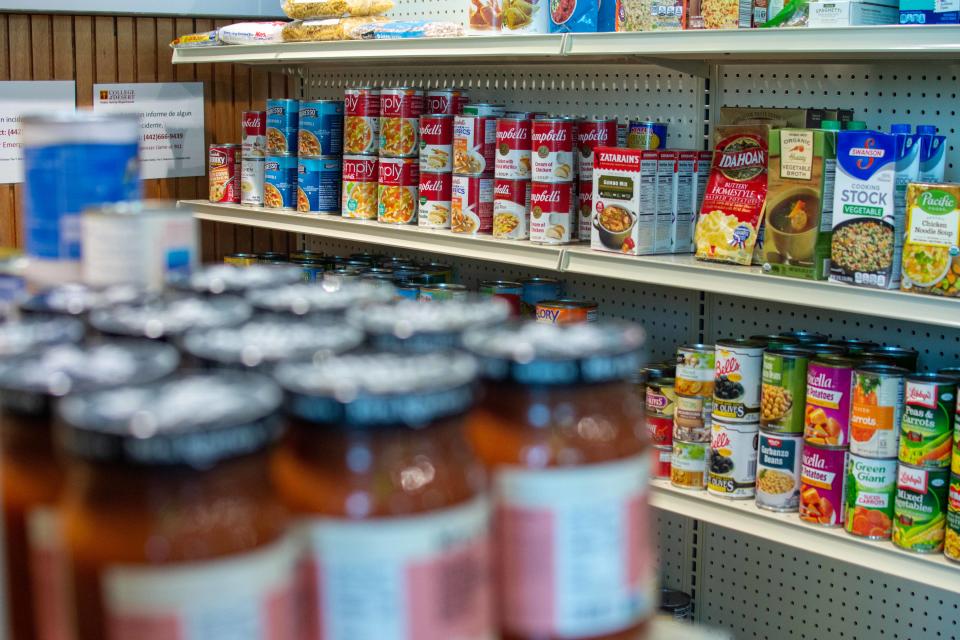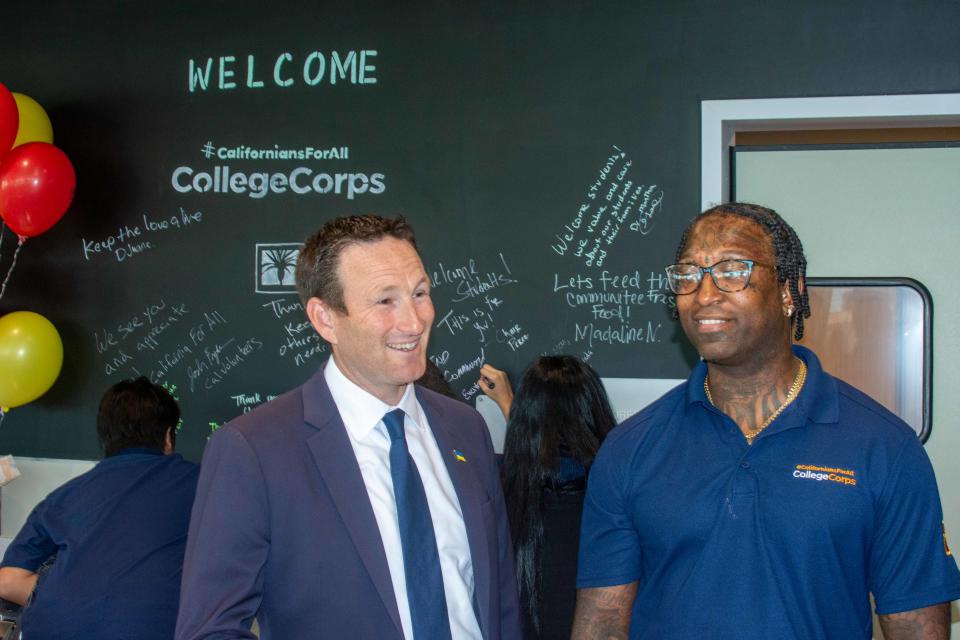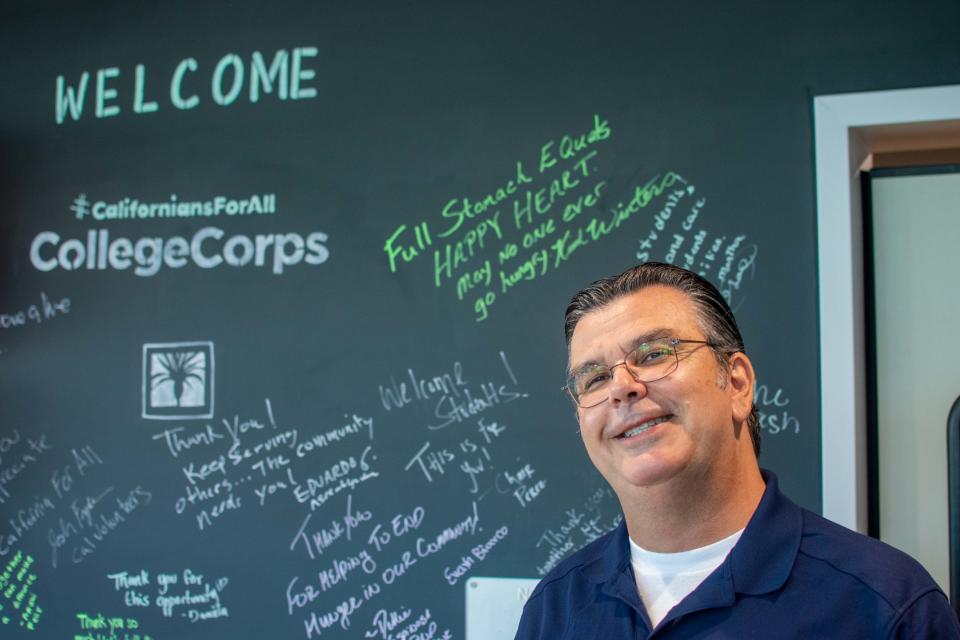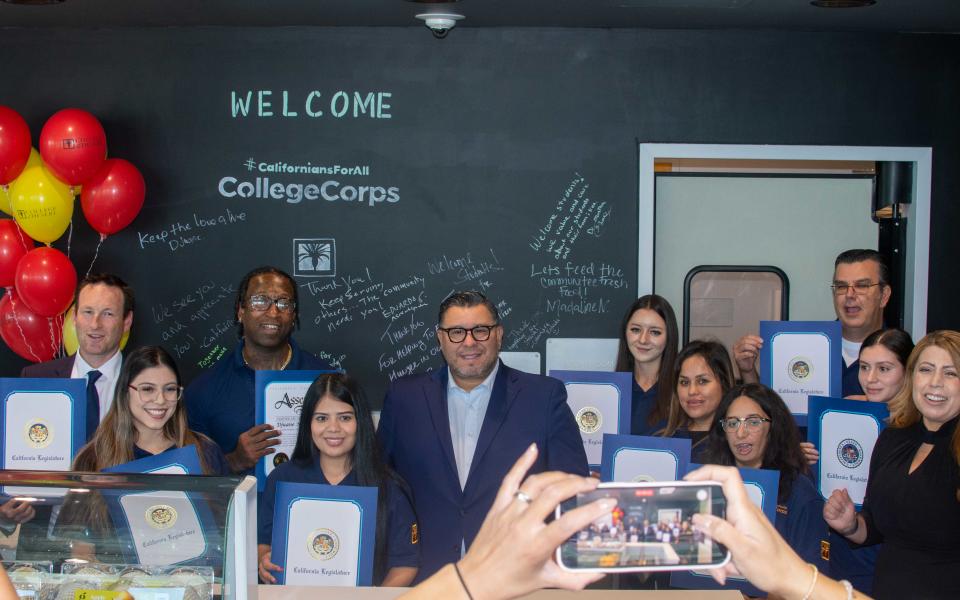College of the Desert unveils new College Corps-funded food bank on the Indio campus
State leaders joined College of the Desert officials in Indio Tuesday to celebrate a $1.8 million investment in COD students and a new on-campus food bank.
The funding comes from Governor Gavin Newsom’s #CaliforniansForAll College Corps, a statewide college service program that will provide thousands of students at 45 schools around the state with $10,000 stipends for educational expenses in exchange for completing a year of service in their communities.
The statewide program is aimed at three issues: inequality, climate change and food insecurity.
Josh Fryday, California’s chief service officer, said the program is based on the GI Bill.
“You serve your community, and you get a stipend for college,” he said.
COD will focus on food insecurity in partnership with FIND Food Bank.
About half the money allocated to COD will go toward paying stipends to nearly 50 college corps fellows; the other half will help COD and Find Food Bank pay the operating costs of a brand new on-campus food pantry opened Tuesday in Indio.

The pantry, which is designed to look and feel like a grocery store — minus any price tags — is open to all COD students to help themselves and their families to up to 35 pounds of food per week, and to connect them with government resources like CalFresh, a monthly food benefits program for low-income individuals and families.
“This is like a prayer being answered,” said college corps fellow DJuane Nunley.
Nunley, 35, juggles the daunting responsibilities of caring for his six children and pursuing a psychology degree at COD.
While parenthood and school will never be an easy balancing act, Nunley’s stipend and the ability to pick up fresh, healthy groceries at no cost on campus, could ease his ability to finish his degree and provide for his family.

As a fellow, he will work 450 hours with Find Food Bank this year, manning the Indio campus pantry and also gaining experience with FIND’s warehousing, logistics and inventory systems for its network of 150 permanent and mobile locations across the Coachella Valley.
FIND Food Bank President and CEO Debbie Espinosa noted the importance of those skills as the warehouse industry grows in the Inland Empire with employers like Amazon coming to the Coachella Valley.
More: College of the Desert students can get $10,000 for year of public service
More: State educational leaders kick off volunteer college corps recruitment in Riverside County
Keith Winters, 50, a part-time realtor working toward a business administration degree at COD, said he wishes the new program had been around 30 years ago.
“I wish something like this were available when I first tried school in my 20s,” he said.

Winters said he chose work over education three decades ago, but the new college corps stipend is helping him find balance later in life between his educational aspirations and his financial responsibilities, including a mortgage.
The full annual cost of attendance at COD for a local student living at home equates to approximately $16,000, according to the college's website. That figure includes approximately $1,300 for tuition, $1,200 for books, $3,430 for miscellaneous costs and $9,500 for food and housing. The college estimates that students living away from home should budget about $18,000 for food and housing.
Another program, plEDGE, provides recent high school graduates with two full years of free tuition and fees at COD.
COD alumnus and State Assemblymember Eduardo Garcia said he hopes the college corps stipend will encourage COD fellows to stay in school and graduate quicker.
“It is a balance to commit yourself to go to school, to have a job, and, in some cases, to have a family and to contribute to the household,” Garcia said.

Fellows also include younger, traditional students like Derick Talay, a recent La Quinta High graduate.
Talay, a business administration student, immigrated to the U.S. from the Philippines before his sophomore year at La Quinta.
He called the program very helpful, adding he also admires the community service aspect.
Talay's aspiration is to see the accumulation of small good deeds in the community, like helping feed families and connecting them to other community and governmental services.
Espinosa added that their work will help ensure students will not go to school on empty stomachs.

COD Superintendent/President Martha Garcia said taking on food insecurity is personal for her because she struggled with it as a single mother raising a son while attending Imperial Valley College. She eventually proceeded to earn her doctorate degree in educational leadership from San Diego State University.
“Food insecurity is a serious and growing problem among college students in our country,” Garcia said.
She cited a recent California Community Colleges survey that estimated that 50% of 1.8 million California community college students struggle with food insecurity, and 12% of them had gone at least one whole day without eating during the prior month because they didn’t have enough money to buy food.
COD is one of 18 community colleges participating in the inaugural college corps class, and applications for next year’s cohort will be opening soon.
Nearby, CSUSB-Palm Desert partnered with the state to offer 25 college corps fellowships this school year. Their fellows will work on expanding existing partnerships with the Coachella Valley's three K-12 school districts to provide mentoring, tutoring, coaching and after-school activities.
Jonathan Horwitz covers education for The Desert Sun. Reach him at jonathan.horwitz@desertsun.com or @Writes_Jonathan.
This article originally appeared on Palm Springs Desert Sun: College of the Desert unveils new on-campus food bank in Indio

